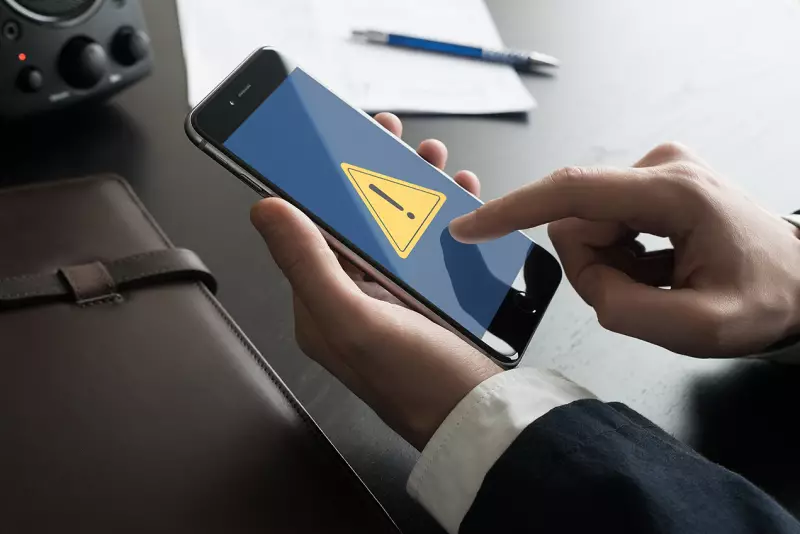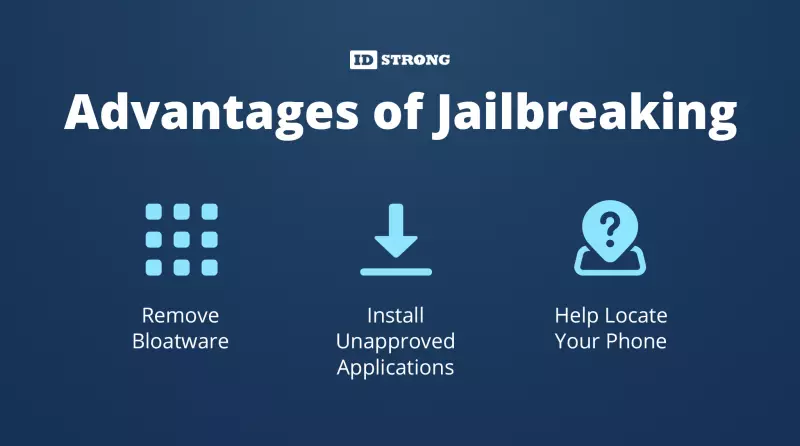Is Jailbreaking Legal and Safe?
Table of Contents
- By Emmett
- Published: Jun 17, 2022
- Last Updated: Jun 20, 2022

If you’re an Apple user, you’ve likely heard something about the mysterious process known as “jailbreaking.” It's a common way to work around the many restrictions manufacturers place on smartphones and other digital devices, but its safety and legal status have always been a bit murky.
What is “Jailbreaking a Phone”?
Jailbreaking allows Apple users to customize their device experience and access many of their smartphone’s locked features. Users gain unauthorized access to the operating system by altering the iOS. Many refer to jailbroken devices as being “pwned.”
Jailbreaking a phone usually involves the installation of specific jailbreaking software. Since you can’t get these sorts of applications on the dedicated app store, users often scour online forums to find any semi-trustworthy website that offers jailbreaking services. There are four primary kinds of jailbreaking: untethered, semi-untethered, tethered, and semi-tethered.
Tethered
A tethered jailbreak requires a computer or other device to accomplish; the device won’t load a jailbroken version without this connection. If the device is turned off, you’ll need to retether it each time you want to enter a jailbroken state. Users can still turn on their device; however, many critical applications will immediately crash unless they reapply the computer’s jailbreak software.
In the worst cases, users get stuck in a “recovery loop” in which the iPhone repeatedly shuts down and restarts trying to correct an error in the boot process. Tethered jailbreaks are undoubtedly the least desirable option, and most people avoid them like the plague.
At one time or another, we’ve all overestimated how far a phone charge will take us. This isn’t a problem with an average iPhone since you can find a place to recharge on the go. However, a dead battery in a tethered-jailbroken phone becomes a genuine safety concern. It could strand you on the road or in an emergency without GPS access, calling, or texting.
Semi-Tethered
In comparison to tethered, a semi-tethered jailbreak isn’t nearly as risky. iPhone owners still require a computer cable connection to initiate the jailbreak after every restart but can use their phone “normally” without doing so.
Customized themes and user-interface changes are reverted, and jailbreak-exclusive applications like the Cydia store will crash when opened.
Untethered
If the jailbreaking process doesn’t require a computer connection, it's considered “untethered.” With this option, you can start your phone up and instantly have your jailbreak applied.
Untethered jailbreaks are the most desirable type but also the most difficult. Apple puts a lot of energy into patching any discovered and popularized jailbreaking exploits. Their efforts make a completely untethered jailbreak on newer versions of iOS very difficult, and most untethered attempts will fail during the boot process. These challenges have made semi-untethered jailbreaking software the preferred method.
Semi-Untethered
Semi-untethered jailbreaks are easier to pull off and don’t wholly uninstall the moment your phone powers down. Users don’t need a computer connection to reapply the jailbreak, but the extensions won’t activate until the user loads a separate jailbreak application on the device.
The issue with this option is that semi-untethered apps must be signed. Doing so requires an enterprise or development certificate from Apple. Modern jailbreaking software may include a “code-signing bypass” to get around this and patch the kernel.
No matter what type of jailbreaking is used, the program will grant you root access to your Apple device. This means you can interact directly with iOS to install applications and software that Apple hasn’t officially approved.
Why Jailbreak a Phone?
There are several advantages to jailbreaking a phone:
- Remove Bloatware: All devices come with some level of bloatware or pre-installed programs that take up space and are often unwanted. Apps like the Games Center and Weather take up space on your device; this can prevent you from filling it with photos, videos, games, and applications you actually want. Jailbreaking allows you to remove these otherwise permanent programs and free up valuable space on your device.
- Install Unapproved Applications: The main reason most users want to jailbreak their phones is to install programs that Apple doesn’t allow in the app store. These range from games or emulators that may violate copyright or messaging services that Apple isn’t partnered with. You can also utilize various file transfer services and file processing programs that can be faster than what's officially offered by Apple.
- Help Locate Your Phone: The “Find My Phone” feature of the iPhone can be incredibly useful, helping you track down your device when lost or stolen through its integration with Apple maps. Unfortunately, the normal version of iOS prevents you from using this feature if your phone was left in airplane mode or otherwise offline. Jailbroken devices can access alternative safety apps that can help them identify thieves, but many aren’t technically allowed by Apple.
Is it Legal and Safe?
This is where it gets a bit complicated. Jailbreaking is legal in many jurisdictions, but the exact nature of the practice falls into several legal gray areas. The process of jailbreaking is legal in the United States as of 2010 due to the Digital Millennium Copyright Act.
Despite jailbreaking being legal in the US, that only allows for the initial act. Once the operating system opens up, your phone becomes a potential gateway for illegal activity. You could unknowingly install pirated (illegal) applications because the Apple Store isn’t vetting your downloads.
Voids the Warranty
Unfortunately, jailbreaking your phone does go directly against Apple's terms of service and therefore voids your warranty. This means any problems you run into with your device after it is jailbroken won’t be covered by Apple and you can’t get it repaired at an Apple-run location.
The jailbreaking process may even cause these issues by itself, in some cases permanently damaging your phone.
Apple has come out publicly against the practice of jailbreaking but rarely prosecutes anyone for the practice (when it does cross a legal line.) Their developers have even stopped signing older iOS patches which prevent users from downgrading to versions that can be more easily jailbroken.
Locks You Out of Updates
If you plan to jailbreak your iPhone, I hope you love your current version of iOS. On top of losing access to official Apple repair facilities, your phone is no longer eligible for updates if you mess with its internal code.
This means that patches that address security issues won’t go through. You become easier game for hackers and cybercriminals, even if they’re using outdated tactics. Think of it as the slowest zebra on the safari. It’s going to get eaten first.
The jailbreaking community occasionally releases hotfixes and quality-of-life updates, but keeping up with everything you need is an entire ordeal. You have to find the solution yourself rather than rely on automated fixes spurred by community feedback.
Additionally, many applications are built to comply with specific operating systems, and you’ll likely see your user experience on these apps deteriorate with time. There are third-party solutions to some of these problems, but you won’t get the stability and speed you’re used to.
Reduces Battery Life
The battery of a pwned device doesn’t last as long as its unmodified counterpart. The problem isn’t due to changes in the hardware, but in the types of applications a jailbroken device typically runs.
Certain programs simply use more power than others, and this is especially true for illegal content. Outside developers don’t have the responsibility to optimize their products for energy efficiency. This is mainly a problem for applications that can run in the background.
You may have unknowingly downloaded an application that brought a malware package along for the ride. Even if you close out of the app, the malware will continue in secret and drain your battery further.
Yes, it's possible to safely jailbreak your device, but it is by no means a risk-free process. You’ll be unable to receive new updates to the iOS system. This can cause stability issues, along with potential freezes and lower battery life. Many users have also experienced “bricking,” or the complete failure of their phones' function. Jailbreaking will disable any security features Apple has turned on automatically, and if you don’t activate your own security measures, you will be vulnerable to hackers.
Without the screening process used by Apple to vet applications for their store, you’ll be at risk of downloading fraudulent or dangerous programs. These can affect your phone's performance, expose your personal information, and leak data that allows cybercriminals to commit fraud. With the data they pull from your phone, these criminals can harm you in a number of ways, including identity theft. There’s also the risk that the jailbreaking software you choose is malware in disguise.
Can You Jailbreak an Android Phone?
“Jailbreak” is a term used exclusively for Apple phones. However, a similar process for altering Android devices is called “rooting.” This term applies to devices under Google, OnePlus, Samsung, and any other phone using a Linux-based operating system.
Rather than jailbreaking, rooting is more technically accurate as both are designed to gain root access to a device’s core infrastructure.
Rooting also comes with the same weaknesses as jailbreaking. Altered phones void the warranty, face more significant security threats, and see a lowered performance. Additionally, there are fewer reasons to root as Android is far less restrictive than Apple regarding blocking off third-party applications.
Why is Jailbreaking a Security Risk for Your iPhone?

While it sounds nice to access a wide variety of unauthorized apps and have more control over your device, jailbreaking poses too many potential risks. A user with a jailbroken phone exposes themselves to the potential of a data leak, which can be harmful both personally and financially. If you’ve already jailbroken your phone and believe your information may have been stolen, you can run a free identity threat scan. If you haven’t jailbroken your phone, don’t. It just isn’t worth it.
How to Reverse a Jailbreak from Your iPhone?
If you’ve already taken the plunge and jailbroken your iPhone, don’t worry, there’s an easy fix. Follow these steps to safely restore your device without losing your data.
Backup the Device and Do a Factory Reset
Your phone doubtlessly has essential information stored on it. Creating a backup lets you save all that information in another place and restore it to your device later. Some applications and adjustments from the jailbreak may carry over, but those can be removed individually after applying the backup.
The easiest way to make a backup on iOS16 is to use Apple’s integrated “iCloud Backup” feature.
- Open Settings > User (Should be Your Name) > iCloud > iCloud Backup
- Tap “Back Up Now” to initiate a manual Backup
Now that your data is safely stored in the iCloud, all you have to do is perform a factory reset on the device. All this requires is to go to Settings > General > Transfer or Reset iPhone.
You may be prompted to enter your Apple ID password for confirmation. After this, wait a few minutes, and your device will return to its default state.



















































































































